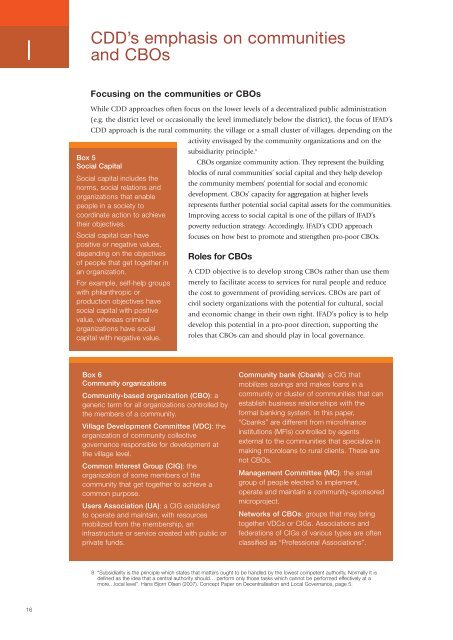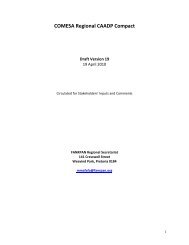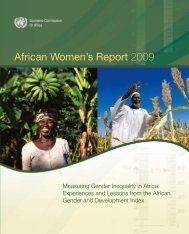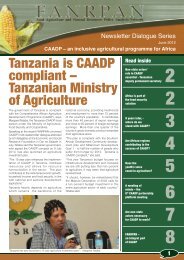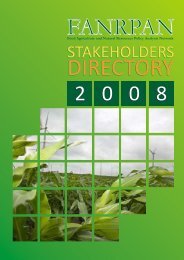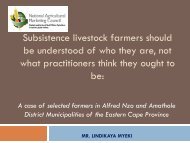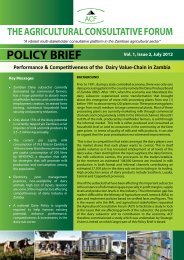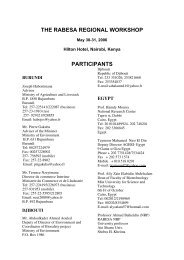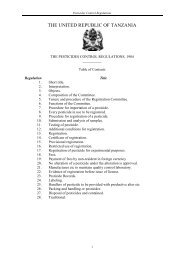Community-driven development decision tools for rural - IFAD
Community-driven development decision tools for rural - IFAD
Community-driven development decision tools for rural - IFAD
- No tags were found...
You also want an ePaper? Increase the reach of your titles
YUMPU automatically turns print PDFs into web optimized ePapers that Google loves.
ICDD’s emphasis on communitiesand CBOsFocusing on the communities or CBOsWhile CDD approaches often focus on the lower levels of a decentralized public administration(e.g. the district level or occasionally the level immediately below the district), the focus of <strong>IFAD</strong>’sCDD approach is the <strong>rural</strong> community, the village or a small cluster of villages, depending on theactivity envisaged by the community organizations and on thesubsidiarity principle. 8Box 5CBOs organize community action. They represent the buildingSocial Capitalblocks of <strong>rural</strong> communities’ social capital and they help developSocial capital includes thethe community members’ potential <strong>for</strong> social and economicnorms, social relations andorganizations that enable <strong>development</strong>. CBOs’ capacity <strong>for</strong> aggregation at higher levelspeople in a society torepresents further potential social capital assets <strong>for</strong> the communities.coordinate action to achieve Improving access to social capital is one of the pillars of <strong>IFAD</strong>’stheir objectives.poverty reduction strategy. Accordingly, <strong>IFAD</strong>’s CDD approachSocial capital can havefocuses on how best to promote and strengthen pro-poor CBOs.positive or negative values,depending on the objectivesRoles <strong>for</strong> CBOsof people that get together inan organization.A CDD objective is to develop strong CBOs rather than use themFor example, self-help groups merely to facilitate access to services <strong>for</strong> <strong>rural</strong> people and reducewith philanthropic orthe cost to government of providing services. CBOs are part ofproduction objectives have civil society organizations with the potential <strong>for</strong> cultural, socialsocial capital with positiveand economic change in their own right. <strong>IFAD</strong>’s policy is to helpvalue, whereas criminaldevelop this potential in a pro-poor direction, supporting theorganizations have socialcapital with negative value. roles that CBOs can and should play in local governance.Box 6<strong>Community</strong> organizations<strong>Community</strong>-based organization (CBO): ageneric term <strong>for</strong> all organizations controlled bythe members of a community.Village Development Committee (VDC): theorganization of community collectivegovernance responsible <strong>for</strong> <strong>development</strong> atthe village level.Common Interest Group (CIG): theorganization of some members of thecommunity that get together to achieve acommon purpose.Users Association (UA): a CIG establishedto operate and maintain, with resourcesmobilized from the membership, aninfrastructure or service created with public orprivate funds.<strong>Community</strong> bank (Cbank): a CIG thatmobilizes savings and makes loans in acommunity or cluster of communities that canestablish business relationships with the<strong>for</strong>mal banking system. In this paper,“Cbanks” are different from microfinanceinstitutions (MFIs) controlled by agentsexternal to the communities that specialize inmaking microloans to <strong>rural</strong> clients. These arenot CBOs.Management Committee (MC): the smallgroup of people elected to implement,operate and maintain a community-sponsoredmicroproject.Networks of CBOs: groups that may bringtogether VDCs or CIGs. Associations andfederations of CIGs of various types are oftenclassified as “Professional Associations”.8 “Subsidiarity is the principle which states that matters ought to be handled by the lowest competent authority. Normally it isdefined as the idea that a central authority should… per<strong>for</strong>m only those tasks which cannot be per<strong>for</strong>med effectively at amore…local level”. Hans Bjorn Olsen (2007). Concept Paper on Decentralisation and Local Governance, page 5.16


